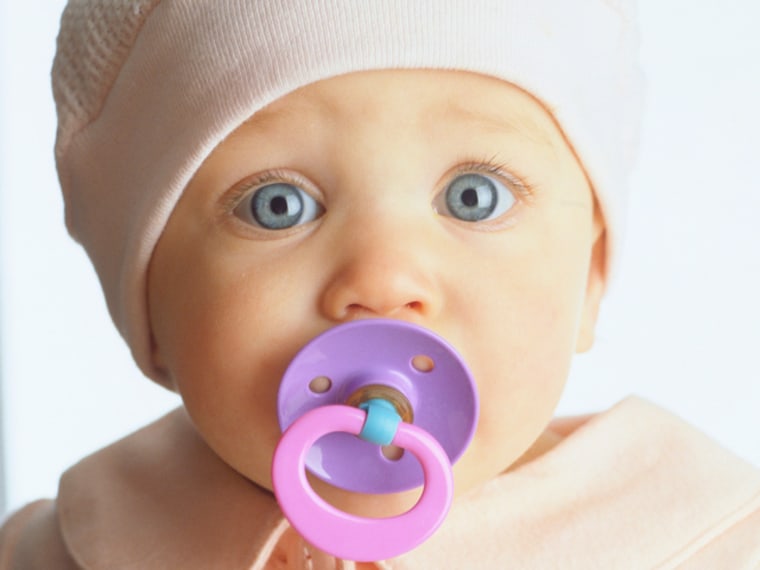Got a wailing newborn? Parents have long used pacifiers to quiet them, despite warnings about nipple confusion from nursing experts.
Now, a few pediatricians are questioning the commonly held belief that pacis meddle with a newborn’s breast-feeding. And in a complete about-face, the latest research suggests that pacifiers may encourage breast-feeding.
In December 2010, Oregon Health & Science University Doernbecher Children’s Hospital locked up pacifiers in the newborn nursery to improve their breast-feeding record even more. To everyone’s surprise, they saw breast-feeding rates drop as soon as the pacifiers were no longer readily available.
“In the lore of our community and some of our medical literature, pacifiers are said to negatively impact breast-feeding,” says study author Carrie Phillipi, an associate professor of pediatrics and medical director of the hospital’s Mother-Baby Unit. “I think that’s not always the case.”
Beginning in December 2010, nurses were instructed to give pacifiers only to babies who needed soothing for procedures such as circumcisions. Each time a nurse retrieved a pacifier from the supply closet, she had to enter a code and the patient’s name.
“When we removed pacifiers from routine distribution, we weren’t seeing the improvements we had expected,” says Phillipi. She and Laura Kair, a resident in pediatrics, studied data collected on the feeding behavior of 2,249 babies born in the hospital between June 2010 and August 2011.
Prior to the pacifier lock-down, about 80 percent of babies born in the hospital were exclusively breastfed. After, the number dropped to about 70 percent.
Phillipi and Kair’s research results didn’t surprise John McDonald, a neonatologist and medical director of the regional women and children's program for Providence Health & Services, Oregon, who was not involved in the study. “When you look at all of the medical literature on the relationship between pacifiers and breast-feeding, the level of scientific evidence doesn’t really support an adverse effect on pacifier use and exclusive breast-feeding.”
Although hiding pacifiers in a supply closet sounds dramatic, many hospitals follow this tactic, as it is one of the “Ten Steps to Successful Breastfeeding” recommended by the World Health Organization and United Nations Children’s Fund. To achieve the coveted WHO Baby-Friendly Hospital status, a hospital must follow all ten steps.
“As our hospital is trying to get Baby-Friendly status, we anticipated that removing pacifiers would improve exclusive breast-feeding,” says Kair. “Pacifiers were a low hanging fruit, removing them was an easy thing to do.”
"The primary reason for WHO's policy on pacifiers is the potential for interference with suckling and establishing lactation," says Dr. Chessa Lutter, a senior advisor in food and nutrition for the Pan American Health Organization/World Health Organization.
"There is some evidence to suggest that giving pacifiers or bottle nipples can interfere with suckling and getting a good latch on. It's very important that the baby be able to properly latch on, which evolves over baby’s first week of life. Establishing a good suck is extremely important for the mother as well, so her own nipple isn’t irritated or damaged," Lutter says.
There’s a wealth of widely accepted research to back up the WHO’s support of exclusive breast-feeding. Moms who breastfeed have an easier time shedding pregnancy pounds, and it reduces their risk for some cancers. Breastfed babies have fewer ear infections and bouts of diarrhea, while also having reduced risk of certain cancers, obesity, and asthma.
Lutter says the WHO's policy "is an old one, put out in 1991. At that point the evidence showed pacifier use lowered breastfeeding. Since then, better randomized studies have been done and the evidence is very mixed. But I think really the concern is establishing a good suck at the get go and discouraging pacifier use to establish lactation."
So whether pacifiers interfere with this healthy habit is still up for debate.
“As we try to support more breast-feeding and we adopt some of these recommended standards like the Baby-Friendly Hospital status, it puts health systems, physicians and parents in this challenging place to say, ‘Is limiting pacifiers truly a proven practice that will help enhance breastfeeding?’” McDonald says.
Unfortunately, no one yet can answer why babies sucking on pacifiers has any impact at all on breastfeeding.
Pacifiers at Doernbecher Children’s Hospital remain behind closed doors. The researchers are not recommending that any hospital or individual parent change their pacifier practice just yet. More research needs to be done, they say, pointing out that this was not a controlled trial, only an observational study.
One limitation of the observational study, Kair admits, is that parents could have brought pacifiers from home and those pacifiers would not have been documented in the study. But that was also the case before the study was conducted.
Kair and Phillipi are presenting their results at the Pediatric Academic Societies annual meeting in Boston on Monday.
“As pediatricians and as moms ourselves, we want to promote breast-feeding because we know it’s best for moms and babies,” Phillipi says. “But we also want to know the best evidence, so that we can help moms be successful with that endeavor.”
Did, or does, your child use a pacifier? Tell us about it on our Facebook page.
More stories on breast-feeding from TODAY Moms:
Controversial ad uses breast-feeding to sell cookies
Wean, baby, wean: The pressure to rest the breast
